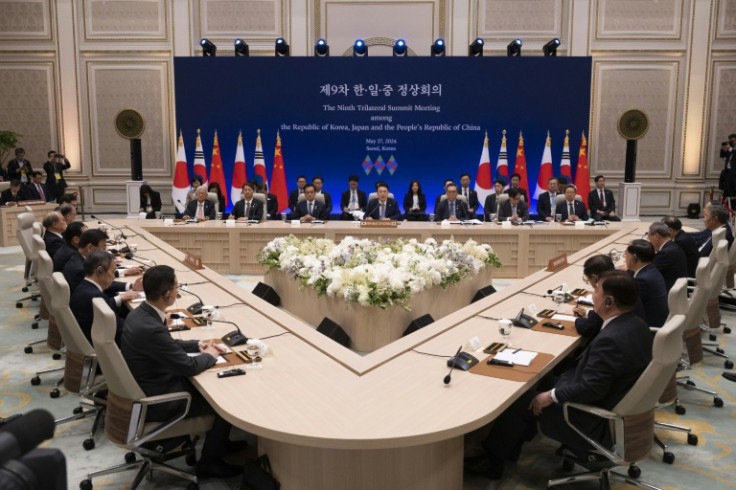South Korea, China, Japan Vow To Ramp Up Cooperation In Rare Summit

Leaders from South Korea, China and Japan reaffirmed their goal of a denuclearised Korean peninsula Monday, during a rare summit at which they also agreed to deepen trade ties.
The summit brought together South Korean President Yoon Suk Yeol, Chinese Premier Li Qiang and Japan's Prime Minister Fumio Kishida in Seoul for the countries' first trilateral talks in nearly five years, partly due to the pandemic, but also once-sour ties.
While North Korea was not officially on the agenda, hours before the leaders met Pyongyang announced that it would soon put another spy satellite into orbit -- a move that violates rafts of UN sanctions barring it from tests using ballistic technology.
At a joint press conference, Yoon and Kishida urged Pyongyang to call off the launch, with the South Korean leader saying it would "undermine regional and global peace and stability."
Yoon also called for a "decisive" international response if Kim goes ahead with his fourth such launch -- aided by what Seoul claims is Russian technical assistance in exchange for Kim sending Moscow arms for use in Ukraine.
But China, North Korea's most important ally and economic benefactor, remained notably silent on the issue, with Premier Li not mentioning it during the briefing.
In a joint statement issued after the talks, the countries used language that has been deployed many times before to reaffirm their commitment to the "denuclearisation of the Korean Peninsula", adding that peace "serves our common interest and is our common responsibility."
As a permanent member of the UN Security Council, China has previously condemned North Korea's nuclear tests, and supported sanctions aimed at curbing its weapons development.
In recent years, as China's relations with the United States have deteriorated, it has increasingly obstructed Washington-led efforts to impose stricter sanctions on the North.
China has consistently called for the denuclearisation of the entire Korean peninsula, while pointing the finger at US-South Korea joint military drills for escalating regional tensions.
Analysts say there is significant technological overlap between space launch capabilities and the development of ballistic missiles.
The press briefing in Seoul and the joint statement "clearly showed the difference of opinions," between the three countries on the issue of North Korea, Lee Dong-gyu, Asan Institute Research Fellow told AFP.
Reaching a quick consensus on how to handle Kim Jong Un's regime was always going to be difficult, he said "because there have been differences in diplomatic and security positions in each country," he said, pointing to the backdrop of geopolitical tension between the US and China.
Even so, the fact that Seoul, Tokyo and Seoul are seeking to ramp up trilateral cooperation and boost economic ties is good sign for future agreements on more difficult topics like Kim's nukes.
"If the three countries do well in (economic cooperation), they can cooperate on security issues based on that foundation," he added.
The three countries announced Monday that they would "keep discussions for speeding up negotiations for a Trilateral FTA."
Chinese Premier Li also said they had agreed not to turn "economic and trade issues into political games or security matters, and rejecting protectionism as well as decoupling or the severing of supply chains," Xinhua reported.
Yoon said that the leaders had "decided to create a transparent and predictable environment for trade and investment, and to establish a safe supply chain."
After their talks, Yoon, Li and Kishida joined a business summit aimed at boosting trade between the countries, which was also attended by top industry leaders.
Yoon, who took office in 2022, has sought to bury the historical hatchet with former colonial power Japan in the face of rising threats from nuclear-armed North Korea.
South Korea and Japan are also close regional security allies of China's arch-rival the United States -- but are also eager to improve trade and ease tensions with Beijing.
"The trilateral cooperation system should be strengthened. We have decided to hold trilateral summits on a regular basis," Yoon said.
President Xi Jinping is China's top leader, with Li serving under him as premier.
Nuclear-armed North Korea successfully launched its first reconnaissance satellite last November in a move that drew international condemnation, with the United States calling it a "brazen violation" of UN sanctions.
Seoul said on Friday that South Korean and US intelligence authorities were "closely monitoring and tracking" presumed preparations for the launch of another military reconnaissance satellite -- which could come as early as Monday, according to the launch window Pyongyang gave to Tokyo.
© Copyright AFP 2025. All rights reserved.





















